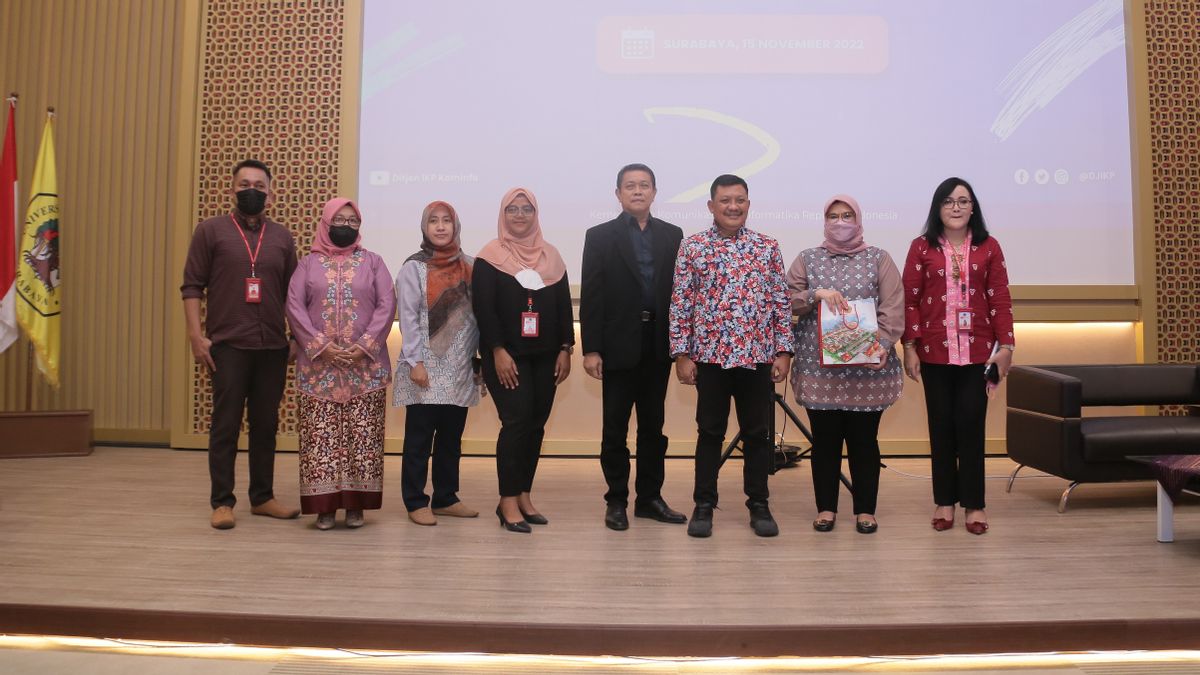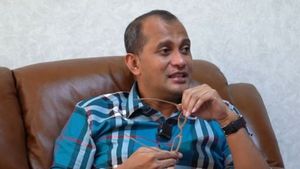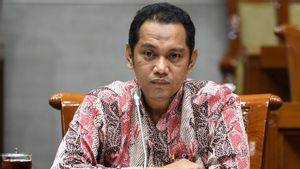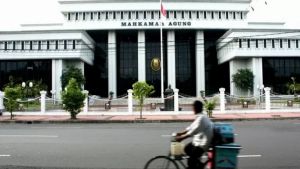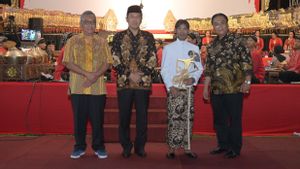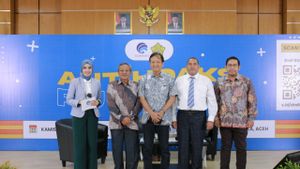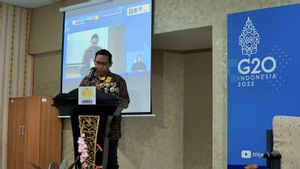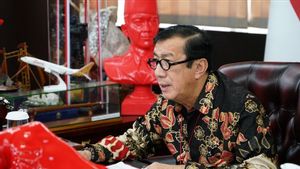JAKARTA - It's been a century since the Dutch colonial Criminal Code is still valid today. Because of that, changes to this ancient legal product are a necessity. The Criminal Code Bill (RUU KUHP) is in the process of socialization, now it's the turn of the city of Surabaya to become the target.
Director of Political Information and Communication Law and Security Directorate General of Information and Public Communication, Ministry of Communication and Informatics, Bambang Gunawan, said that as a legal state based on Pancasila, a national legal system that is harmonious, synergistic, and comprehensive, and dynamic in legal development is needed, namely the revision of the Code. -Criminal Law (RUU KUHP).
"The government's efforts to revise and compile a national criminal law recodification system that aims to replace the old Criminal Code as a legal product of the Dutch East Indies colonial era need to be carried out immediately, so that it is in accordance with the dynamics of society," he added.
This was conveyed by Bambang, in his speech at the Socialization of the Criminal Code Bill, in Surabaya, Tuesday, November 15.
Public Dialogue
Previously, the Ministry of Communication and Informatics had held an RKUHP Public Dialogue Kick Off in collaboration with the Coordinating Ministry for Political, Legal and Human Rights and the Ministry of Law and Human Rights, according to President Joko Widodo's directions at a Limited Meeting regarding the RKUHP. The Public Dialogue aims to provide understanding to the public and open up space for dialogue to gather input on the Draft Criminal Code Bill.
"Apart from that, several ministries and agencies jointly carried out outreach in the form of public dialogues in 11 cities in Indonesia to disseminate the draft RUU KUHP and gather input from all elements of society," he explained.
Bambang explained, the socialization will be continued again to convey narratives related to the Criminal Code Bill, which are easily digested by the public. He hopes that the Socialization of the Criminal Code Bill can be a means of socializing discussions regarding adjustments to the Criminal Code Bill to the public elements at large.
"Hopefully this event will bring great and positive benefits to us, the community and the country. Let's support the Criminal Code made by the Indonesian Nation," he concluded.
The socialization session began with a presentation from a Lecturer at the Faculty of Law, University of Jember, I Gede Widhiana Suarda, explaining that the drafting of the Criminal Code Bill had gone through a long journey. In the past year, the Criminal Code Bill has become one of the priority pieces of legislation that can be passed in 2022.
"The reason for the need for a new Criminal Code is that if the nation is already independent, then politically it must also be independent in law," he explained.
According to Gede, Indonesia as an independent nation also needs legal products that were born from the womb of the Indonesian nation itself. Therefore, society also needs to support this legal product as a form of sovereignty of an independent nation.
Gede explained, in 2019 the drafting of the Criminal Code Bill was delayed due to public views regarding the pros and cons of the RUU KUHP, but this is the crucial point to be able to bring together and harmonize different views, then translate it into a single norm that is chosen and used in the Criminal Code Bill. .
"From the perspective of the pros and cons, the midpoint is taken as a way to provide space for the pros and cons so that they can regulate the norms intended by society," he added.
Nationalism
In addition, Gede explained that the Criminal Code Bill is a symbol of the civilization of an independent and sovereign nation and upholds the principles of nationalism and appreciates community participation. So it is hoped that even though there is debate over one or two articles that have been drafted, it will not stop all articles of the Draft Criminal Code created by the children of the Indonesian people.
In the next session, Academics of the Faculty of Law, Trisakti University and RKUHP Spokesperson, Albert Aries, explained that after the public dialogue that had been carried out in 11 cities by the RKUHP outreach team, 69 inputs from the public and 4 proofreaders had been adopted for the body and explanation. This is a follow-up to President Jokowi's directive regarding meaningful participation in the drafting and formulation of the RKUHP.
"On the November 9 draft, there were 6 articles that had been withdrawn from the RKUHP which is proof that the drafting team for the RKUHP listened to the aspirations of the community," he said.
Multicultural
In addition, Aries revealed that compiling the Criminal Code in a multi-ethnic, multi-cultural and multi-religious country is not easy. Because as a diverse country, Indonesia has a rich culture so each region has a special character regarding the laws that live in society.
"It should be seen that the purpose of the Criminal Code Bill is related to the renewal of criminal law and also the modern penal system which should have been changed from the old Criminal Code," he added.
This aims to change the current condition of overcrowding in prisons and also provide an understanding of a new paradigm from a retributive paradigm to justice that is restorative, rehabilitative, and corrective.
Aries also added that one of the issues related to insulting the president does not necessarily limit freedom of opinion, because our constitution respects freedom of expression but does not allow acts of insult.
"That this article was drafted in the RUKHP taking into account the principles of democracy, so the penalty is under 3 years in prison and is also a complaint offense compared to Article 1 (34) which is an ordinary offense and the penalty is 6 years in prison," he concluded.
BACA JUGA:
Hukum positif
Pada sesi terakhir, Ketua Program Studi Doktor Ilmu Hukum Universitas 17 Agustus 1945, Yovita Arie Mangesti, mengungkapkan bahwa dalam perjalanan menyusun produk Undang-undang buatan Indonesia perlu diapresiasi sebagai upaya terobosan baru oleh pemangku kebijakan negeri, sehingga dapat dipahami norma hukum positif yang berfungsi menjadi panduan publik untuk berperilaku.
“Sebagai warga negara Indonesia, terutama mahasiswa hukum yang mengkaji hukum pidana, kita juga berperan untuk terus mengawal berjalannya hukum pidana ini ke depannya,” tambahnya.
Yovita menjelaskan, bahwa draf RUU KUHP terus mengalami berbagai perubahan, hal ini perlu dipandang sebagai bentuk adaptif dan responsif terhadap kebutuhan masyarakat. Sehingga draf yang dihasilkan pada 9 November lalu bisa menjadi draf final RUU KUHP untuk segera disahkan.
“RUU KUHP juga telah disusun berdasarkan asas keseimbangan yang digali dari nilai-nilai kearifan bangsa Indonesia yang merupakan salah satu keunggulan dari RUU KUHP,” ungkapnya.
“Berdasarkan isu-isu krusial yang ada di RUU KUHP dapat dilihat bahwa RUU KUHP cukup memotret situasi faktual yang ada di masyarakat,” tambahnya.
Menurutnya, keunggulannya RUU KUHP terdapat 18 keunggulan yang dalam penyusunan diawali dengan asas keseimbangan yang dibangun dari ide untuk mengakomodir kepentingan yang ada di masyarakat.
“Harapannya juga bahwa RUU KUHP ini dapat menjadi suatu hukum yang humanis,” tambahnya.
Ia menyatakan, bahwa ini dapat dilihat dari salah satu tujuan pemidanaan adalah rehabilitasi dengan memasyarakatkan terpidana. Dengan mengadakan pembinaan dan pembimbingan dan menyelesaikan konflik dengan restorative justice secara lebih manusiawi.
“Selain itu, salah satu keunggulan yang saya apresiasi yaitu adanya pengaturan terkait disablitas, sehingga persoalan disabilitas juga merupakan objek hukum dan memang seharusnya dilindungi oleh undang-undang.” tutupnya.
Sosialisasi mengajak masyarakat untuk mendukung RUU KUHP buatan Indonesia. Acara ini diselenggarakan secara luring di Universitas 17 Agustus 1945 Surabaya, dan dapat disaksikan melalui aplikasi Zoom dan kanal YouTube Ditjen IKP Kominfo.
